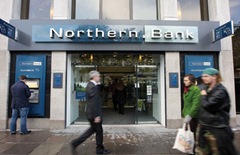Banking in the storm
Gary McDonald takes stock of the current state of banking and weighs up how much influence the local banks have amid the blame game.
The financial services sector, above all others, has faced the most scathing attacks from business and the public for its role in causing the deepest recession in generations.
Senior executives in the City were accused of mismanagement on a grand scale, and few outside the banking industry could fathom the economic justification for the exponential rises in their rates of pay over the past 20 years.
Their actions were viewed as the modern day equivalent of Nero fiddling while Rome burnt.
The entire banking system came close to collapse in October 2008 until the British Government stepped in with a £600 billion rescue package, and many of the key high street banks still remain partnationalised.
That crisis underlined the danger of having too many eggs in one basket and served as a reminder of the urgent need to regenerate other sectors to make a more significant contribution to the economy.
For the four main banks in Northern Ireland – Northern Bank, Ulster Bank, First Trust and Bank of Ireland – in the eyes of the public it was “guilt by association”. The heads of those four banks have already had to face the wrath of Stormont’s Finance Committee in a series of meetings with local politicians to discuss the global economic downturn’s effects on Northern Ireland.
As if they could make a significant difference. They can only pay lip service to the elected representatives, because ultimately the control of their organisations lies outside Northern Ireland – two of the four “local” banks are headquartered in Dublin, one in Edinburgh and the other in Copenhagen.
“Nevertheless, the banks, like politicians and business leaders in Northern Ireland, are committed to working together to steer the economy through these stormy economic waters,” says Eric Leenders, executive director of the British Bankers’ Association.
“They are committed to supporting their customers, whether personal or business, throughout the downturn and sheltering the economy as far as possible from the global financial pressures coming to bear on us all. They are continuing to make money available to borrowers and recognise their responsibility to the economy in these difficult market conditions.”
Worthy words or weasel words? It’s the latter if you believe a February survey commissioned by the Better Banking Campaign, a coalition of charities and community organisations aiming to tackle financial exclusion by increasing access to mainstream financial services for people and businesses who most need it.
Its spokesman Steve Wyler said: “Considering how much public money has propped up the financial institutions, it’s deplorable that they aren’t currently supporting the people and businesses most in need.
“Most people believe access to bank accounts and affordable credit are basic rights, so we want to see this as a priority for all the political parties.”
“We are not talking about lending for lending’s sake, but about responsible lending to people and businesses who want to get on, who come from communities who would benefit greatly from better access to mainstream financial services.”
The “quadopoly” of the four big banks in Northern Ireland was challenged about 20 years ago with the arrival of a raft of rivals, initially with a “name plate” presence only, but latterly with a growing visibility on the high street.
Several major international financial services companies have also established operations in Northern Ireland, including US-based Citi, Allstate Corporation, Liberty Mutual and Wombat Financial Software in addition to Halifax and Santander.
Indeed today the financial services industry in Northern Ireland employs 20,000 people in more than 1,200 firms and has a rapidly developing cluster of leaders covering investment banking, administration, retail and insurance services.
Many of the newcomers have flexed their muscles and have secured significant slices of business in niche areas. Barclays, for example, claims bank finance is under-utilised by Northern Ireland third-level institutions as a funding source, and its corporate banking team has completed term loan agreements of £70 million to Queen’s University in Belfast over the last four years.
Chris Hearn, head of education banking at Barclays, said: “We’re finding universities in Northern Ireland increasingly looking to private sources of funding as traditional streams of revenue dry up.
“Traditionally the financing model of the typical university was based on four main income streams: state funding, fees from foreign students, donations and philanthropy, and research. But with budget cuts and donors feeling the squeeze, these previously guaranteed lines of finance have dried up and universities need to look at other ways of raising funds, which is where we can come in.”






